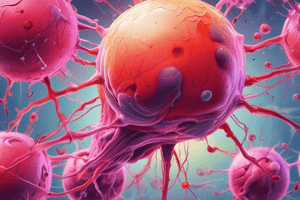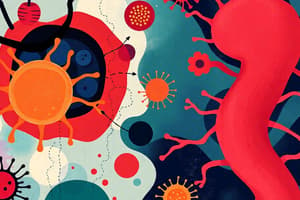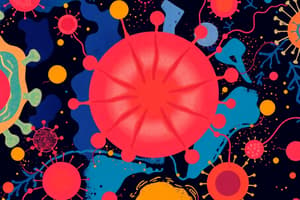Podcast
Questions and Answers
What is the primary purpose of primary lymphoid organs?
What is the primary purpose of primary lymphoid organs?
- Filter microbes and pathogens.
- Produce and mature immune cells. (correct)
- Store immune memory cells.
- Remove old blood cells.
What important role did Dr. Edward Jenner play in immunization history?
What important role did Dr. Edward Jenner play in immunization history?
- He developed the first vaccine for smallpox. (correct)
- He discovered penicillin.
- He was the first to isolate HIV.
- He identified the immune response mechanism.
Which immune cells are primarily produced and matured in the thymus?
Which immune cells are primarily produced and matured in the thymus?
- B-cells
- Macrophages
- Neutrophils
- T-cells (correct)
Why is the spleen considered the largest lymphoid organ?
Why is the spleen considered the largest lymphoid organ?
What major immune dysfunction is characterized by the loss of T-helper cells?
What major immune dysfunction is characterized by the loss of T-helper cells?
Which of the following structures are NOT classified as secondary lymphoid organs?
Which of the following structures are NOT classified as secondary lymphoid organs?
What significant historical figure is known for contracting smallpox and subsequently surviving it?
What significant historical figure is known for contracting smallpox and subsequently surviving it?
What is a primary function of lymph nodes in the immune system?
What is a primary function of lymph nodes in the immune system?
What is the primary composition of pus?
What is the primary composition of pus?
What do antigen-presenting cells (APCs) link in the immune system?
What do antigen-presenting cells (APCs) link in the immune system?
Which term describes the part of an antigen recognized by an antibody?
Which term describes the part of an antigen recognized by an antibody?
Which kind of immunity is mediated by antibodies?
Which kind of immunity is mediated by antibodies?
What type of cells do cytotoxic T cells primarily target?
What type of cells do cytotoxic T cells primarily target?
Which of the following is NOT considered a non-microbial antigen?
Which of the following is NOT considered a non-microbial antigen?
What is the role of memory B cells in the immune response?
What is the role of memory B cells in the immune response?
What function does the Major Histocompatibility Complex (MHC) serve in the immune system?
What function does the Major Histocompatibility Complex (MHC) serve in the immune system?
What role do MHC I molecules play in the immune system?
What role do MHC I molecules play in the immune system?
Which molecules are typically expressed on antigen-presenting cells?
Which molecules are typically expressed on antigen-presenting cells?
What is a unique feature of MHC molecules in identical twins?
What is a unique feature of MHC molecules in identical twins?
What is the first step in the antigen presentation process by APCs?
What is the first step in the antigen presentation process by APCs?
Which cells are considered 'professional' antigen-presenting cells (APCs)?
Which cells are considered 'professional' antigen-presenting cells (APCs)?
What are the characteristics of an antigen that provoke an effective immune response?
What are the characteristics of an antigen that provoke an effective immune response?
How do T-cell receptors recognize antigens?
How do T-cell receptors recognize antigens?
What is the primary function of the adaptive immune response?
What is the primary function of the adaptive immune response?
Which type of leukocyte is primarily responsible for phagocytosis?
Which type of leukocyte is primarily responsible for phagocytosis?
What is the primary function of Helper T cells (CD4+)?
What is the primary function of Helper T cells (CD4+)?
Which cells can directly kill virus-infected cells and tumor cells?
Which cells can directly kill virus-infected cells and tumor cells?
What is the first line of defense in the innate immune system?
What is the first line of defense in the innate immune system?
What distinguishes the second line of defense in innate immunity?
What distinguishes the second line of defense in innate immunity?
Which immune cell is specifically known for releasing histamine during allergic reactions?
Which immune cell is specifically known for releasing histamine during allergic reactions?
What role does macrophages play in the immune system?
What role does macrophages play in the immune system?
Which of the following is considered part of the cellular factors of the second line of defense?
Which of the following is considered part of the cellular factors of the second line of defense?
During an inflammatory response, which of the following symptoms is NOT typically observed?
During an inflammatory response, which of the following symptoms is NOT typically observed?
What do eosinophils primarily target in the immune response?
What do eosinophils primarily target in the immune response?
Which cells are responsible for initiating antibody-mediated immune responses?
Which cells are responsible for initiating antibody-mediated immune responses?
Interferons are part of which aspect of the immune response?
Interferons are part of which aspect of the immune response?
What characteristic distinguishes lymphocytes from other leukocytes?
What characteristic distinguishes lymphocytes from other leukocytes?
What is the primary role of dendritic cells in the immune response?
What is the primary role of dendritic cells in the immune response?
What best defines an antigen?
What best defines an antigen?
Which cells convert into plasma cells and produce antibodies?
Which cells convert into plasma cells and produce antibodies?
What is the first stage of a typical adaptive immune response?
What is the first stage of a typical adaptive immune response?
Which T cells are primarily responsible for directly attacking infected body cells?
Which T cells are primarily responsible for directly attacking infected body cells?
Where do T Cells mature?
Where do T Cells mature?
What is the role of cytokines in T Cell activation?
What is the role of cytokines in T Cell activation?
Which co-receptor is essential for T Cell activation along with MHC-II and peptide?
Which co-receptor is essential for T Cell activation along with MHC-II and peptide?
Which cell type assists in directing the immune response by guiding phagocytes and other immune cells?
Which cell type assists in directing the immune response by guiding phagocytes and other immune cells?
What happens during checkpoint inhibition in the immune response?
What happens during checkpoint inhibition in the immune response?
What is the primary function of antibodies produced by plasma cells?
What is the primary function of antibodies produced by plasma cells?
Flashcards are hidden until you start studying
Study Notes
Immune System Dysfunction
- SCID (Severe Combined Immune Deficiency Syndrome) is a genetic disorder in which the immune system is severely impaired. Individuals with SCID have a reduced ability to fight infections.
- AIDS (Acquired Immune Deficiency Syndrome) is caused by the HIV (Human Immunodeficiency Virus) virus. HIV destroys T Helper cells, which are crucial for the immune system's ability to fight off infections.
Harnessing the Power of the Immune System
- Immunization is the process of introducing a weakened or inactive form of a pathogen into the body to stimulate an immune response without causing disease. This allows the body to develop immunity to the pathogen.
Discoveries in Science
- Penicillin G (benzylpenicillin) is an antibiotic discovered by Alexander Fleming. He observed that the mold Penicillium chrysogenum produced a substance that killed Staphylococcus aureus bacteria.
Smallpox and Vaccination
- Smallpox is a highly contagious and deadly viral disease that was responsible for millions of deaths throughout history.
- Pharaoh Ramses V died of smallpox in 1157 BCE.
- The last known case of smallpox in the wild occurred in 1977 in Merca, Somalia. Ali Maow Maalin, a hospital cook, survived with treatment.
- Dr. Edward Jenner developed the first successful vaccine against smallpox in 1796 in London.
- The World Health Organization (WHO) declared smallpox eradicated in 1980.
Components of the Immune System
- The immune system consists of lymphoid organs, immune cells, and secretions of immune cells.
Lymphoid Organs
- Primary lymphoid organs are where stem cells divide and immune cells develop. These include:
- Bone Marrow: responsible for producing blood cells, including B cells and immature T cells. Mature B cells develop here.
- Thymus: located above the heart, this organ contains T cells, dendritic cells, epithelial cells, and macrophages. This is where T cells mature. It atrophies after maturity.
- Secondary lymphoid organs are where most immune responses occur. These include:
- Lymph Nodes: scattered throughout the body, they filter microbes and contain macrophages that phagocytize microbes entering the lymph.
- Spleen: the largest lymphoid organ, it removes microbes and old erythrocytes.
- Lymphoid Nodules: these are small, localized collections of immune cells.
- Tonsils: located in the throat, they help to protect against infections.
- Peyer's Patches and MALT (Mucosal-Associated Lymphoid Tissues): found in the digestive tract, they provide immune protection against ingested pathogens.
- Appendix: although its function is not fully understood, it is believed to be part of the immune system.
Immune Cells
- Leukocytes (white blood cells) are the primary cells of the immune system.
- Lymphoid Cells:
- T cells: these cells are responsible for cell-mediated immunity. There are several types of T cells:
- Cytotoxic T cells (CD8+): destroy infected cells.
- Helper T cells (CD4+): activate B cells, cytotoxic T cells, NK cells, and macrophages.
- Regulatory T cells (CD4+): suppress the immune system and help to prevent autoimmune diseases.
- B cells: responsible for antibody-mediated immunity. They transform into plasma cells, which produce antibodies.
- NK cells (Natural Killer cells): kill cells that are infected with viruses or are cancerous.
- T cells: these cells are responsible for cell-mediated immunity. There are several types of T cells:
- Myeloid Cells:
- Macrophages: phagocytize microbes and other debris.
- Dendritic cells: phagocytize microbes and present antigens to T cells.
- Lymphoid Cells:
Myeloid Cells
- Eosinophils: destroy parasites.
- Basophils: release chemicals such as histamine and prostaglandins.
- Mast Cells: release chemicals, primarily histamine.
- Neutrophils: phagocytes that are the most abundant type of white blood cell in the blood.
- Monocytes: mature into macrophages and dendritic cells.
Antibodies
- Antibodies are proteins produced by B cells that bind to specific antigens. They are crucial for the body's ability to fight off infections.
Host Defenses
- The body has two major lines of defense against pathogens: non-specific/innate immunity and specific/adaptive immunity.
Non-specific/Innate Immunity
- The body's first line of defense, it provides a general barrier against pathogens.
- Physical Barriers: these include the skin, mucous membranes, and cilia.
- Chemical Barriers: these include stomach acid, lysozyme, and sebum.
- Microbiological Barriers: these include the normal flora of the body.
Second Line of Defense - Innate Immunity
- This line of defense is activated when pathogens breach the first line of defense.
- Cellular Factors:
- Phagocytic Cells: These include neutrophils, macrophages, and dendritic cells.
- Cells with Inflammatory Mediators: These include basophils, mast cells, and eosinophils.
- Natural Killer Cells: These cells kill infected or cancerous cells.
- Humoral Factors:
- Inflammation and Fever: These are non-specific responses to tissue damage that help to fight off infection.
- Antimicrobial Substances: These include complement, cytokines, and acute phase reactants.
- Interferons: These are proteins that interfere with viral replication.
- Cellular Factors:
Inflammation
- Is a non-specific response to tissue damage. It involves four distinct signs and symptoms: redness, heat, pain, and swelling.
- Has three stages:
- First, the body releases chemicals that cause the blood vessels to dilate, increasing blood flow to the area. This causes redness and heat.
- Second, fluid leaks from the blood vessels into the tissues, causing swelling.
- Third, white blood cells migrate to the area to remove pathogens and debris.
Extracellular Traps (NETs)
- Are structures released by neutrophils that trap and kill pathogens outside of the cell.
Antigen-Presenting Cells (APCs)
- APCs are cells that present antigens to T cells to activate an adaptive immune response. This is a critical step in linking innate and adaptive immunity.
- Professional APCs include dendritic cells and macrophages.
- Neutrophils are an example of a cell that can release NETs to trap pathogens outside of the cell.
Antigen
- A substance capable of inducing an immune response.
- Immunogen: a material that induces an immune response.
- Allergen: an antigen that causes an allergic reaction.
- Ligand: any molecule that binds to a specific receptor.
Antigen-Presenting Cells (APCs)
- Present exogenous antigens with MHC II.
- Steps involved:
- Ingest the antigen
- Digest the antigen into peptide fragments
- Synthesize and package MHC-II molecules
- Bind peptide fragments to MHC-II
- Insert the antigen–MHC-II complexes on the plasma membrane
- Steps involved:
Adaptive Immune Response (Acquired, Specific)
- Reactivity: An antibody binds specifically to the antigen that provoked it.
- Immunogenicity: The antigen can provoke an immune response by stimulating antibody production to that antigen.
- Antigen Presenting Cells (APCs) (MHC II + antigen):
- Dendritic cells (Interdigitating Dendritic Cells) / “Professional APC”
- Macrophages
- B lymphocytes (B cells)
Specific/Adaptive Immunity
- This line of defense is specific to particular pathogens and provides long-lasting immunity.
- B cells and T cells are involved.
- Memory for previously encountered antigens.
Major Histocompatibility Complex (MHC)
- MHC I: expressed on all nucleated cells; responsible for presenting self-antigens and signaling to the immune system that the cell is healthy.
- MHC II: expressed on all antigen-presenting cells (macrophages, dendritic cells, and B cells); responsible for presenting foreign antigens to T cells to activate an immune response.
- HLA: Human Leukocyte Antigen (the human MHC) - different HLA types are defined by their antigen-binding areas.
- Only identical twins have the same MHCs on their cells.
T-cell Receptor Recognition
- T-cell receptors only recognize antigens when they are associated with MHC II proteins.
MHC and Cell Death
- Recall, natural killer (NK) cells can destroy cells with altered or missing MHC I on their surface. This means the cell is acting strangely/suspiciously.
PHGY 209 Midterm Exam
- Date: Tuesday, October 8, 2024
- Time: 7:00 - 8:30 pm
- Location: TBA - Check myCourses the morning of the exam
- Format: 35 Multiple Choice Questions (MCQs), approximately 2-3 MCQs per lecture
- Content: Body fluids, transport mechanisms, blood, and immunology
- Note: Tutorial with Dr. [Name of Dr. for tutorial, if available]
Studying That Suits You
Use AI to generate personalized quizzes and flashcards to suit your learning preferences.




